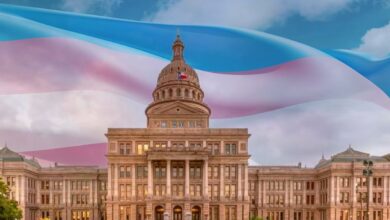
Advocates Declare Victory Against Anti-LGBT Attacks in the Texas Legislature
With 10 days left in the legislative session, only one anti-LGBT measure had passed.
By John Wright
Photo by Eric Gay/AP
With 10 days remaining in the 2015 legislative session that ended June 1, LGBT advocates were on the cusp of a huge victory.
Of the more than 20 anti-LGBT proposals introduced this year, only one had passed the House and Senate—and advocates said that bill, the so-called “Pastor Protection Act,” isn’t anti-LGBT in its final form and merely reaffirms existing religious-freedom laws.
After two other anti-LGBT proposals cleared committee, House Democratic allies scored major back-to-back wins in mid-May when they ran out the clock on the high-profile antigay marriage bill from Rep. Cecil Bell, R-Magnolia, and then knocked down a license-to-discriminate adoption amendment with a procedural challenge. Both proposals would re-emerge in the session’s waning days, but neither appeared to have a realistic chance of passing before the Legislature gaveled out on June 1.
“It’s certainly encouraging that some of the really bad bills appear to be going nowhere, and that the only bill that’s moving forward does essentially what the law already does,” said Dan Quinn, a spokesman for the pro-LGBT Texas Freedom Network. “If we can get out of the session without any of those other bills passing, it would clearly be a big step forward.”
Quinn said one of the keys to beating back anti-LGBT legislation was opposition from the Texas business community, which feared the type of backlash that followed Indiana’s passage of a religious-freedom law in March. “I think when Indiana exploded like it did, it really made a lot of folks sit up and think, ‘Do we really want to go down that road ourselves?’” Quinn said. “I think the Democrats were very smart in their parliamentary tactics. But then it was also an effort of LGBT groups and civil-liberties organizations working very closely together on a common strategy to fight these bills.”
Daniel Williams, legislative specialist for Equality Texas, credited “the strong work of our allies in the Legislature and the outcry of everyday Texans, including business leaders, speaking to their elected representatives, making it clear that Texas is no place for hate.”
“I think we’re seeing in Texas the pioneering of an anti-LGBT Southern strategy, and I think today Texas showed the nation how to respond,” Williams said following the defeat of Bell’s antigay marriage bill.
With other anti-LGBT legislation stalled, groups such as Texas Values and the Texas Pastor Council latched on to the “Pastor Protection Act” as their top priority. They also lashed out at the Texas Association of Business over the state chamber of commerce’s opposition to anti-LGBT bills.
The Pastor Protection Act is designed to protect clergy and churches from being forced to participate in same-sex weddings. But LGBT advocates say it merely reaffirms existing protections under state and federal law. The bill passed the House in a 141–2 vote on May 21, and the state’s two openly LGBT representatives voted for it.
Januari Leo, director of public affairs at Legacy Community Health, also noted that $3 million cut from HIV prevention and moved to abstinence education by the House was reinstated in the final proposed budget, which she called “a major victory.”
On the flip side, none of the more than 30 pro-LGBT proposals that were introduced had passed, although a study of homeless youth proposed by Rep. Sylvester Turner, D-Houston, cleared the House and was moving through the Senate.
A bill that would allow same-sex parents to have both names on the birth certificates of adopted children reached the House floor for the first time, but didn’t come up for a vote before the deadline. And a “Romeo and Juliet” bill to legalize age-appropriate dating for gay youth died in a 79–51 House floor vote—the first vote on an explicitly pro-LGBT bill in 14 years.
Meanwhile, the Houston GLBT Political Caucus came out against an HIV criminalization bill that cleared the House and awaited a vote by the Senate.
Quinn noted that even if the U.S. Supreme Court rules in favor of nation-wide marriage equality this month, and the community escapes the legislative session without major damage, the fight for equality will be far from over.
“In Texas, outside of the major cities, you can still be fired from your job, denied housing, denied public services, simply because of who you are and who you love,” Quinn said. “Discrimination against LGBT people in Texas is still legal outside of the big cities. The battle for equality is far from won in Texas, but it seems to be taking a big step forward.”











Comments